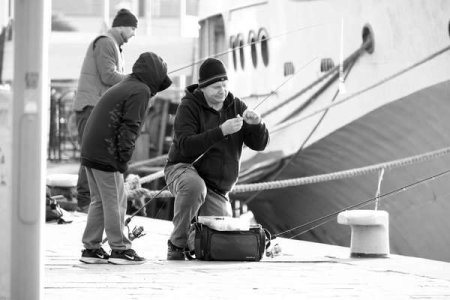You Won’t Believe the Price of Tortilla Chips in This Rural Part of The US
By
Veronica E.
- Replies 0
In the vast, rugged beauty of rural Alaska, the stunning landscapes and close-knit community are truly special. However, there's a hidden challenge many don't consider—the high cost of basic groceries.
In Kotzebue, a small coastal town of about 3,000 residents, even a simple bag of tortilla chips can be surprisingly expensive. Here at The GrayVine, we’re taking a look at how this high cost of living impacts the seniors who call this remote place home.
Kotzebue’s isolation brings both beauty and challenges. While the tight-knit community and stunning scenery are appealing, the cost of living is high. With no roads leading in or out, all goods must be flown in, significantly increasing prices.
A video posted by Grant Magdanz highlights this, showing inflated prices such as $9.19 for a quart of orange juice, $11.29 for a bag of Tostito tortilla chips, and $17.43 for Starbucks coffee, all of which shocked viewers. Even a simple bouquet of flowers can cost up to $89.99, illustrating the steep price of isolation.
TikTok / Grant Magdanz
The High Cost of Living
For seniors on fixed incomes in this area, the high cost of living can be overwhelming. Simple essentials like butter, bread, and toilet paper come with hefty price tags, making budgeting for necessities a real struggle. Despite these challenges, the community remains strong.
Many residents rely on hunting and fishing to supplement their diets, and sharing food with neighbors is a common practice. This sense of community and mutual support helps residents thrive, prioritizing relationships and cooperation over material concerns.
Why Stay in Rural Alaska?
The decision to live in remote and costly areas like Kotzebue comes down to intangible benefits that can't be measured in dollars. Residents value their deep connection to nature, the strong sense of community, and the unique lifestyle they lead.
In places like these, there's a richness of experience that transcends the financial challenges. Whittier, for example, 217 residents living in one building, Begich Towers, which highlights the resilience and adaptability of Alaskan communities.

Adapting to the High Cost
Adapting to the high cost of living requires a strong sense of community and resourcefulness. Many often rely on hunting, fishing, foraging, and bartering to make ends meet.
The residents of Kotzebue demonstrate the value of making the most of what they have. While the cost of living is high, the rewards of community, self-reliance, and a close connection to nature are what truly make life worth living in these remote areas.

Have you encountered or heard of situations where the cost of living is significantly high because of location? How would you adjust to such circumstances? We’d love to hear your stories and thoughts in the comments below. Let’s talk about the challenges and rewards of living in remote areas, and how we can apply the lessons learned from these resilient communities to our own lives.
In Kotzebue, a small coastal town of about 3,000 residents, even a simple bag of tortilla chips can be surprisingly expensive. Here at The GrayVine, we’re taking a look at how this high cost of living impacts the seniors who call this remote place home.
Kotzebue’s isolation brings both beauty and challenges. While the tight-knit community and stunning scenery are appealing, the cost of living is high. With no roads leading in or out, all goods must be flown in, significantly increasing prices.
A video posted by Grant Magdanz highlights this, showing inflated prices such as $9.19 for a quart of orange juice, $11.29 for a bag of Tostito tortilla chips, and $17.43 for Starbucks coffee, all of which shocked viewers. Even a simple bouquet of flowers can cost up to $89.99, illustrating the steep price of isolation.
TikTok / Grant Magdanz
The High Cost of Living
For seniors on fixed incomes in this area, the high cost of living can be overwhelming. Simple essentials like butter, bread, and toilet paper come with hefty price tags, making budgeting for necessities a real struggle. Despite these challenges, the community remains strong.
Many residents rely on hunting and fishing to supplement their diets, and sharing food with neighbors is a common practice. This sense of community and mutual support helps residents thrive, prioritizing relationships and cooperation over material concerns.
Why Stay in Rural Alaska?
The decision to live in remote and costly areas like Kotzebue comes down to intangible benefits that can't be measured in dollars. Residents value their deep connection to nature, the strong sense of community, and the unique lifestyle they lead.
In places like these, there's a richness of experience that transcends the financial challenges. Whittier, for example, 217 residents living in one building, Begich Towers, which highlights the resilience and adaptability of Alaskan communities.

In rural Alaska, many people rely on hunting and fishing not just for sport, but to put food on the table. Image Source: Pexels / Roman Biernacki
Adapting to the High Cost
Adapting to the high cost of living requires a strong sense of community and resourcefulness. Many often rely on hunting, fishing, foraging, and bartering to make ends meet.
The residents of Kotzebue demonstrate the value of making the most of what they have. While the cost of living is high, the rewards of community, self-reliance, and a close connection to nature are what truly make life worth living in these remote areas.
Key Takeaways
- A social media user showcased the high cost of groceries in rural Alaska, where food prices are significantly inflated compared to the rest of the United States.
- The high prices are attributed to the remote location of towns like Kotzebue, which results in all goods needing to be flown in.
- Staples such as butter, orange juice, bread, and tortilla chips all come with a much higher
price tag in these rural communities. - Despite the high cost of living, the local community has a strong bond, with many residents choosing to live there for the unique lifestyle and close-knit environment.
Have you encountered or heard of situations where the cost of living is significantly high because of location? How would you adjust to such circumstances? We’d love to hear your stories and thoughts in the comments below. Let’s talk about the challenges and rewards of living in remote areas, and how we can apply the lessons learned from these resilient communities to our own lives.






